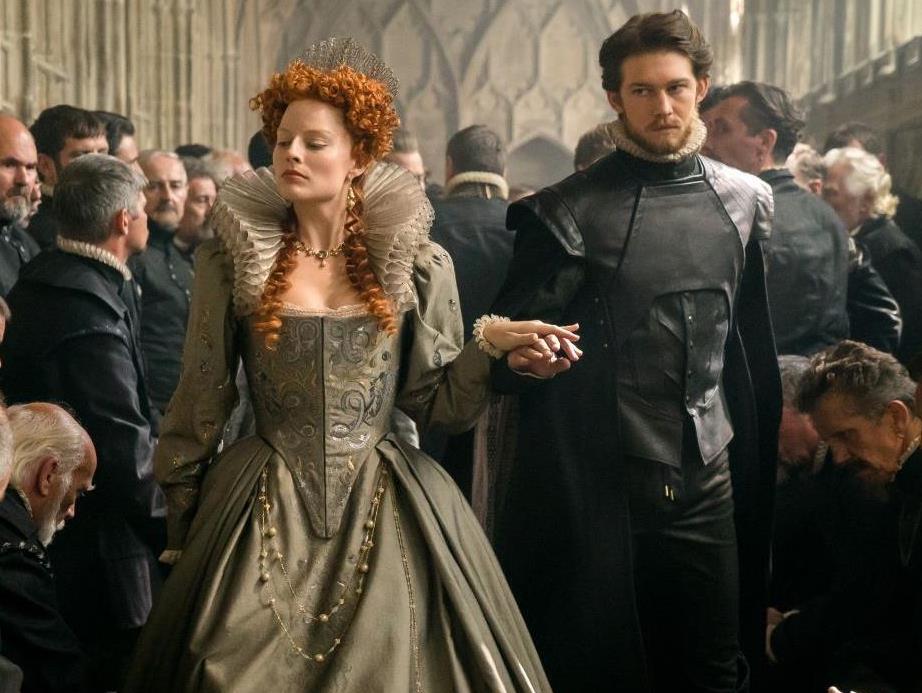Image: Margot Robbie as Elizabeth Tudor in Mary Queen of Scots.
Based on a revisionist biography by John Guy, Mary Queen of Scots is a very traditional biopic: the sort your mum will enjoy if Yorgos Lanthimos’ The Favourite weirds her out too much. At its heart is the conceit that Mary Stuart (Saoirse Ronan) and Elizabeth Tudor (Margot Robbie) were just two cousins: ordinary women in extraordinary situations who could only truly be understood by one another.
Throughout the film, the respective queens struggle, in a broadly feminist way, for love, political power and dynastic posterity. For Josie Rourke – a stage director making her behind-the-camera debut – and screenwriter Beau Willimon (House of Cards) the tragedy isn’t really Mary’s execution for treason, or Elizabeth’s failure to secure her succession. It’s that the demands of the crown, and specifically the idiot men who cluster around it, created fatal misunderstandings that kept apart two women who could have protected one another.
It’s an appealing concept. But while the film’s aesthetics are liberal, its values are conservative: it can only resolve its central tension between what’s authentic and fake, what’s natural and what’s contrived, in boring, sexist ways. Its depiction of Mary as effortlessly beautiful, feminine and honest requires a contrasting vision of plain, childless Elizabeth as pathetic and disingenuous.
The cast’s careful diversity instantly signals a play for ‘wokeness’. Gemma Chan (Crazy Rich Asians) plays Elizabeth’s handmaiden Bess of Hardwick; Adrian Lester is a dark-skinned Thomas Randolph, Elizabeth’s envoy to the Scottish court. And the Catholic Mary’s real-life struggle for legitimacy in Protestant Scotland is depicted as being fuelled by homophobia – the austere Presbyterian Church founder John Knox (an almost unrecognisable David Tennant) operates as a familiar kind of religious wowser.
Mary’s Italian private secretary David Rizzio (Ismael Cruz Cordova), rumoured to be the real father of James I, is here depicted not as her lover, but as her femme gay best friend. When Mary catches David in bed with her weak drunkard of a husband, Henry Darnley (Jack Lowden), she’s unexpectedly compassionate, telling David he can’t help his ‘nature’, and pointing out ruefully that Darnley has seduced them both.
Again and again, the film shows us Mary’s ‘naturalness’ or Elizabeth’s ‘inauthenticity’. Mary is always simply dressed, with clean, pale-amber hair, while Elizabeth is encumbered by fashionable gowns, her elaborate coiffure a lurid vermilion. Clad in blue denim, Mary rides out through Scottish moors and forests with Darnley, or with her half-brother James, Earl of Moray (James McArdle), a lumbersexual honey.
Meanwhile, Elizabeth catches ‘the pox’ and becomes humiliatingly disfigured, hiding behind veils and thickly pasted makeup. She schemes against Mary – even plotting to marry her own lover, a clearly reluctant Robert Dudley (Joe Alwyn), to the Scottish queen. She sadly tells her wily counsellor William Cecil (Guy Pearce) that to rule, she has had to become a man.
Mary’s authentic femininity grieves Elizabeth even as it beguiles the filmmakers. We see Mary bloodied in childbirth, while between Elizabeth’s legs are the red ribbons of a craft project she’s working on. In another risible scene, Elizabeth visits her stables, where the sight of newborn foals moves her to bunch up her skirts in imitation of a pregnant silhouette.
Impressively, Margot Robbie rises above this material to actually make you feel Elizabeth’s pain. Ironically, it’s the ‘artificial’ queen Elizabeth who feels the more complex and human. As Mary, Ronan has an appealing, fresh-faced luminosity; but the script requires her to fluctuate foolishly between determination and naïveté. In portraying her as pure and natural, the film turns her into a puppet – condemned, as David has been, by her ‘nature’.
The film culminates in a historically preposterous meeting between the two queens (who never actually met), in a laundry shed hung with diaphanous bed-sheets. Here, the film’s retrogressive ideas about women are at their most grating. Dressed like a Tudor Ronald McDonald, Elizabeth sadly reveals to Mary the sad remnant wisps of her real hair.
‘Your gifts will be your downfall,’ Elizabeth warns her cousin, to which Mary retorts, ‘Should you murder me, remember you murder your sister… and your queen!’ It’s the kind of empty rhetoric that sounds good in a movie trailer. But like this film, it fails to satisfy.
|
3 stars
|
★★★
|
Mary Queen of Scots
Director: Josie Rourke
US, 2018, 124 mins
Release date: January 17
Distributor: Universal Pictures
Rated: MA15+
Actors:
Director:
Format:
Country:
Release:





